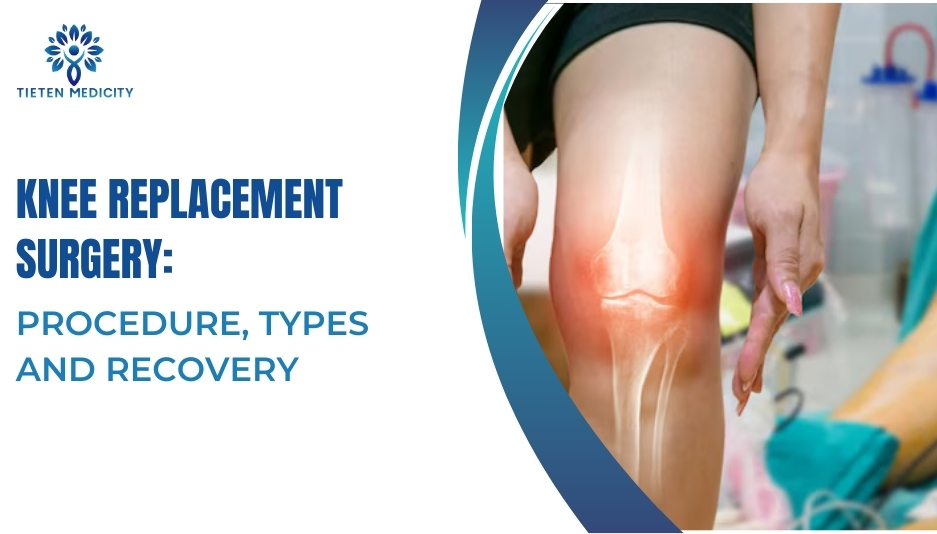
Author: Dr. Bakul Arora
Knee replacement surgery deals with the replacement of knee joints. It is an extensive and serious surgery that involves replacing the damaged parts of your natural knee joint with an artificial one, known as a prosthesis made of plastic and metal. Considering the critical aspects involved in this surgery, Tieten Medicity has the best and most experienced knee replacement doctors in Thane.
This surgery involved a procedure called arthroplasty which focuses on joint replacement. Individuals who opt for this surgery usually have major knee arthritis, in which the knee cartilage is damaged and the surface becomes uneven or eroded due to some serious injury. This leads to pain, instability, stiffness in the body and a change in the alignment.
Some of the symptoms that remain the same even after performing nonsurgical treatments can be a severe reason why an orthopedic may recommend this surgery. These symptoms are:
Usually, knee replacement surgery is recommended in cases of arthritis, osteoarthritis, rheumatoid arthritis, and even post-traumatic arthritis caused by bone fractures and severe injuries.
There are mainly two types of knee surgery – Partial and Total knee replacement surgery. Here’s what these entail:
Total Knee Replacement – As the name suggests, this type of surgery involves the replacement of 3 areas of knee joints such as medial (inner part), lateral (outer part), and patellofemoral (under the kneecap). This surgery is recommended by doctors only in case of severe knee pain that majorly hampers the quality of life and mobility.
Partial Knee Replacement – In this surgery, only a few damaged parts of the knee joints are replaced with an artificial one. Generally, partial knee replacement is common in young adults who have undergone a severe knee injury or have a traumatic experience. Both surgeries are safe and do not usually create any complications post-surgery. To get effective results, it is better to choose the best knee replacement surgery in thane. Now that you are aware of the types of knee replacement surgery, let’s look at its procedure.
The procedure of performing this surgery is vast but simple. They are as follows:
1. Before Surgery: Tests to be Performed
Several tests are to be undertaken for evaluation before the day of in-clinic surgery. These tests are not fixed as it would depend on the recommendations of your surgeon. Some of the most common tests are:
It is important to be open about all the medications and other over-the-counter supplements that you might be taking to the surgeon, as you might be required to stop certain medications that might not work with the surgery.
Additionally, you need to stop eating and drinking a day before surgery, Your surgeon will guide you on the timings and duration for which you need to keep your stomach empty. Usually, it is recommended to avoid eating or drinking 12 hours before the surgery.
2. The Surgery Day: Primary Day
On the day of surgery, it is better to punctual to avoid any delay. To begin with, the surgeon will first numb your body by giving anesthesia (general/ regional) depending on whether the doctor wants to numb your below waist or simply wants you to sleep.
Then, the actual treatment begins, where the surgeon performs the following:
This whole process generally takes around 1-2 hours.
After the knee replacement surgery is successful, you will be shifted to a recovery room. Doctors will keep you under observation and ensure that you wake up from anesthesia without any problems or complications. Once you wake up, they will ensure that there are major improvements in your knee joints and your constant suffering has come to an end.
In some scenarios, doctors discharge the patients on the same day, while some patients are kept under observation for a few hours for their health safety.
Now, that you are well aware of the surgical procedure, let’s move forward and understand the recovery stage.
Generally, it takes around 1 year to recover fully from the surgery. However, one may resume work within 6 weeks of surgery. The recovery time depends on several factors such as:
Post-surgery, your surgeon will provide the best-customized plan for a speedy recovery, depending on your knee condition. Commonly, a standard plan may include:
Knee replacement surgery alleviates the severe pain in knee joints and repairs the damaged parts effectively. By following the procedure and post-recovery tips, one can recover easily under the guidance of the best surgeons.
In case you are looking for the best knee replacement doctors in Thane, then you must consider Tieten Medicity as we specialize in it.
© 2026, TIETEN MEDICITY. All Rights Reserved.